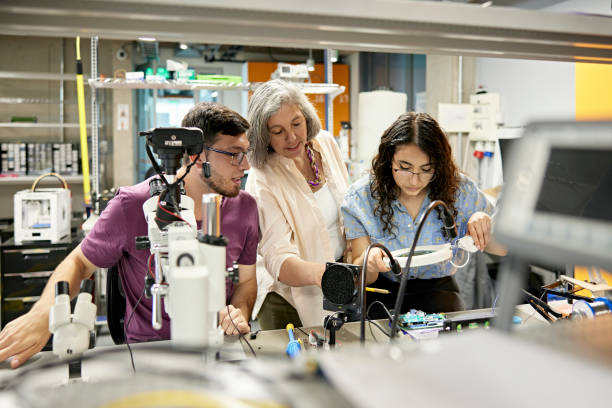
Debunking myths about attending a technical college or trade school
Posted by
For decades, the prevailing philosophy among many parents, students, and even counselors has been that the best path after high school graduation is to attend a four-year college. Yet, that conventional wisdom is outdated and inaccurate. Here’s why.
Myth: College grads earn more than tradespeople
It’s a common misconception that a four-year college degree guarantees a higher income. While some college grads may earn more on average over their careers, many skilled trades offer competitive — and even superior — salaries, without the added burden of high student loan debt.
Electricians, plumbers, HVAC technicians, and welders, for example, often earn high wages immediately after completing their training and apprenticeships. These trades offer clear paths for career advancement and even entrepreneurship. According to the Bureau of Labor Statistics, the 2024 national average salary for an electrician was over $62,000, as was a plumber’s annual salary.
Myth: College is the only path to a successful career
There’s no guarantee that a college degree will automatically result in a high-paying job and a successful career. Trade schools and technical colleges offer specialized training that directly addresses today’s job market needs. In fact, the demand for skilled tradespeople has surged, making these graduates essential to our economy.
The escalating cost of traditional college also leaves more graduates with substantial debt. In contrast, trade school programs are typically shorter and more affordable, enabling graduates to enter the workforce quickly with minimal or no debt and begin earning a good salary earlier.
Myth: A career in the trades is dangerous and dirty
Depending on the trade, grime goes with the territory. And yes, some jobs are more physically demanding and inherently more dangerous than others. The Occupational Safety and Health Administration (OSHA) is responsible for implementing measures to ensure that workers and working conditions are safe and clean. Insurance regulations also play a part. Construction companies, for example, with poor safety records must pay much higher insurance premiums, and some companies with egregious records may not qualify for insurance coverage at all.

Myth: Trade work is seasonal and unpredictable
This outdated myth doesn’t hold true for most trade careers. Essential services are always needed, regardless of the season or economic climate. HVAC systems and cars can break down whenever. Leaks, clogged drains, and water heater issues don’t take holidays. Hospitals and clinics operate 24/7, and they rely on fully functional equipment.
Other skilled trades, like industrial maintenance, manufacturing, and welding in fabrication shops, work indoors. Large-scale infrastructure projects (roads, bridges, utilities, public buildings) and the ongoing need to maintain and modernize existing infrastructure provide consistent work for many trades, often spanning multiple seasons or years.
While some highly specialized outdoor construction roles may experience busier periods during warmer months, smart planning by companies (e.g., staggering projects, cross-training employees, and seeking indoor work) helps avoid seasonal slowdowns.
Myth: Only students who struggled academically should attend trade school or technical college
Some think trade school is merely a fallback for those who choose not to pursue a four-year degree. But trade schools and technical colleges provide specialized training in high-demand fields that require a unique, often sophisticated skill set. These schools give students hands-on experience from industry experts — a practical, career-focused approach that’s a strategic decision for high school grads who want to avoid debt, secure stable employment, and start earning sooner.
Myth: Trade school or technical college training limits career growth
A trade school or technical college education often provides a solid foundation for diverse and substantial career growth, offering paths just as rewarding as those stemming from a college degree.
Trade careers typically have clear ladders for advancement, from apprentice to journeyman to master, in the electrical, plumbing, and HVAC industries, for example. Tradespeople can specialize in particular niches, which increases their value and earning potential. Experienced tradespeople promote to team leads, foremen, superintendents, and project and operations managers.
One of the most significant avenues for growth in the trades? Starting your own business. Many successful tradespeople began in the field and then leveraged their skills and experience to launch their own companies.

Myth: Trade schools and technical colleges don’t offer financial aid
Finances are certainly a key factor to consider when choosing your post-high school educational path. But trade schools aren’t reserved for students on a tight budget. They’re a great choice for anyone seeking specific, career-focused training. Many trade schools and technical colleges offer scholarships, grants, and flexible payment options to increase the accessibility of their training programs.
Myth: Trade schools lack academic rigor and don’t challenge students
Traditional university programs have a long-standing reputation for academic excellence, which lends them prestige. However, it’s a popular misconception that trade school and technical college courses are less demanding or rigorous. In reality, these schools prepare students to become licensed professionals — a path requiring a thorough grasp of core concepts, solid problem-solving skills, and the ability to adapt to evolving technologies.
The hands-on nature of technical curricula can make them more challenging than college degree programs. This practical approach particularly benefits students who thrive with tactile learning experiences.
Myth: It’s hard to find a job if you attend trade school or technical college
Not at all! The economy is short of skilled tradespeople. Construction, manufacturing, healthcare support, and automotive services (to name a few) need qualified individuals. This high demand means graduates are in high demand.
Trade schools and technical colleges design their curricula to address the skills gaps employers identify, developing programs in collaboration with industry partners to ensure graduates have the right skills and hands-on abilities businesses want.
Many programs have established robust relationships with local businesses, often resulting in internships, apprenticeships, and direct job placement opportunities for their students and graduates. These schools often have dedicated career services departments working to connect graduates with employers seeking their skills.
Myth: Potential employers don’t value a trade school education as much as a college degree
This myth couldn’t be further from the truth. Employers value a trade school education equally if not more than a college degree because its graduates are prepared with highly specialized, immediately applicable, high-demand skills.
Many skilled trades require specific certifications and licences. Trade schools and technical colleges prepare students to pass these critical exams, which are the true “credentials” valued by employers in these fields.
Hiring a trade school graduate often represents a better return on investment for an employer. They get a productive employee sooner, who may command a competitive (but not inflated) starting salary and who can contribute directly to the bottom line without the extensive onboarding sometimes required for graduates with less experience.
For more inspiration, check out our Guide to Pathways After High School.
Blog Categories
- Career Advice
- College Admissions
- Colleges & Universities
- Financial Aid and Scholarships
- For Counselors
- For Parents
- For Students
- Gap Years
- Mental Health and Wellness
- Online Learning
- Performing and Visual Arts
- STEM Majors and More
- Summer Programs
- Teen Volunteering
- Trade & Vocational Schools
- Tutoring & Test Prep

Organization with listings on TeenLife? Login here
Register for Free
We’re here to help you find your best-fit teen-centered academic and enrichment opportunities.
Forgot Password
"*" indicates required fields








